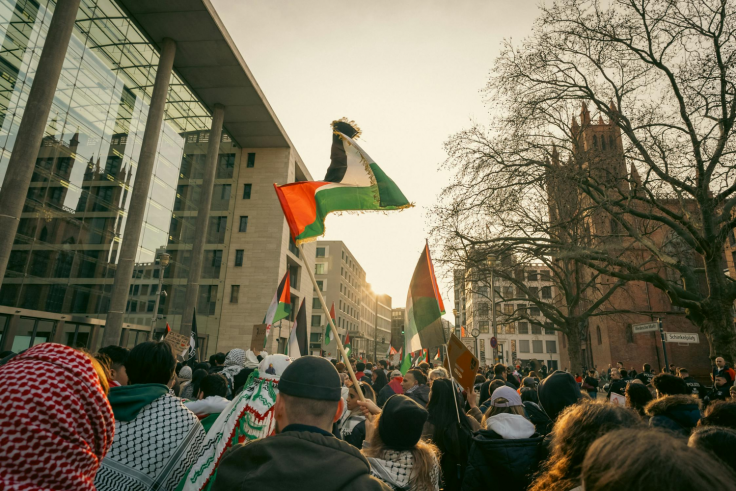Graduation season is typically a time of celebration and accomplishment for college students, but for some, it has become a period of uncertainty and frustration.
Several students across various universities in the United States have had their degrees withheld due to their involvement in pro-Palestinian protests. This disciplinary action has sparked a heated debate on the balance between free speech and university regulations.

Students in Limbo: The Immediate Impact
At the University of Chicago, Youssef Hasweh and three other students found themselves in a precarious situation. Just a week before graduation, Hasweh received an email informing him that his degree would not be conferred due to his participation in a protest encampment. "Four years and just a criminal record, nothing else," Hasweh lamented. The university cited disruptive conduct as the reason for withholding degrees, leaving these students in academic and professional limbo.
Devron Burks, a Vanderbilt University student, faced a similar fate. Following an occupation of an administration building, Burks was arrested and expelled. With their degree withheld and a job offer rescinded, Burks is grappling with the financial burden of student debt without the prospects that a completed degree typically offers. "Without my degree conferral, I can't move on with my life," Burks stated, highlighting the severe personal consequences of their activism.
READ MORE : Minister Of Education Thanks Global Student Movement For Supporting Justice In Gaza And The West Bank
The Universities' Stance: Disciplinary Measures and Justifications
Universities involved in these incidents have largely defended their actions by pointing to policies designed to maintain order and discipline. Harvard University, for instance, has postponed the degree conferral of several students involved in protests until at least 2026. While Harvard officials declined to comment on specific cases, they emphasized the importance of maintaining a respectful and non-disruptive academic environment.
Princeton University also withheld degrees from two seniors pending an investigation into a protest during an alumni event. Jennifer Morrill, a spokesperson for Princeton, noted that the university enforces viewpoint-neutral rules regarding the time, place, and manner of protests. "Significantly disrupting University operations and events is not permitted," Morrill explained, underscoring the institution's commitment to maintaining order while allowing for peaceful demonstrations.
Similarly, Columbia University and Barnard College have issued interim suspensions to over 30 students involved in pro-Palestinian protests. The universities have yet to announce whether these suspensions will become permanent, leaving many students uncertain about their academic futures.
Balancing Free Speech and University Regulations
The actions taken by these universities have ignited a broader conversation about the rights of students to engage in political activism and the responsibilities of educational institutions to uphold order. Proponents of the students argue that these disciplinary measures are an overreach that stifles free speech and peaceful protest. "This was really sneaky of the school, and I think it reveals where they stand on free speech," said Syd Sanders, a Harvard student who helped organize a protest against Israel's military campaign in Gaza.
On the other hand, university officials argue that while they support free speech, they must also enforce rules to ensure that academic operations are not disrupted. New College in Florida, for example, defended its decision to consider withholding degrees from students who interrupted a commencement ceremony with chants of "free Palestine." "We support and protect the right of free speech while resolutely insisting upon civil discourse," the school stated.
The debate extends beyond individual institutions to a national conversation about the role of universities in political discourse. Critics of the disciplinary actions argue that universities should be spaces where students can freely express their political beliefs without fear of severe repercussions. However, supporters of the universities' actions contend that maintaining a structured and respectful environment is crucial for the academic mission.
The Future of Student Activism
As these students await the outcomes of their appeals and university investigations, their futures hang in the balance. The repercussions of their activism serve as a powerful reminder of the complex interplay between free speech and institutional regulations. For students like Hasweh and Burks, the fight for their degrees is not just about academic achievement but also about standing up for their beliefs. "Even if I don't get my degree, I'd do it a thousand times over," Hasweh declared, reflecting the resolve of many student activists.
This ongoing conflict between student activism and university policies will likely continue to shape the landscape of higher education, challenging institutions to find a balance that respects both free expression and the need for orderly conduct. As more students engage in political activism, universities will need to navigate these tensions carefully, ensuring that they uphold their educational values while also respecting the rights of their students to voice their concerns.
© 2026 University Herald, All rights reserved. Do not reproduce without permission.








